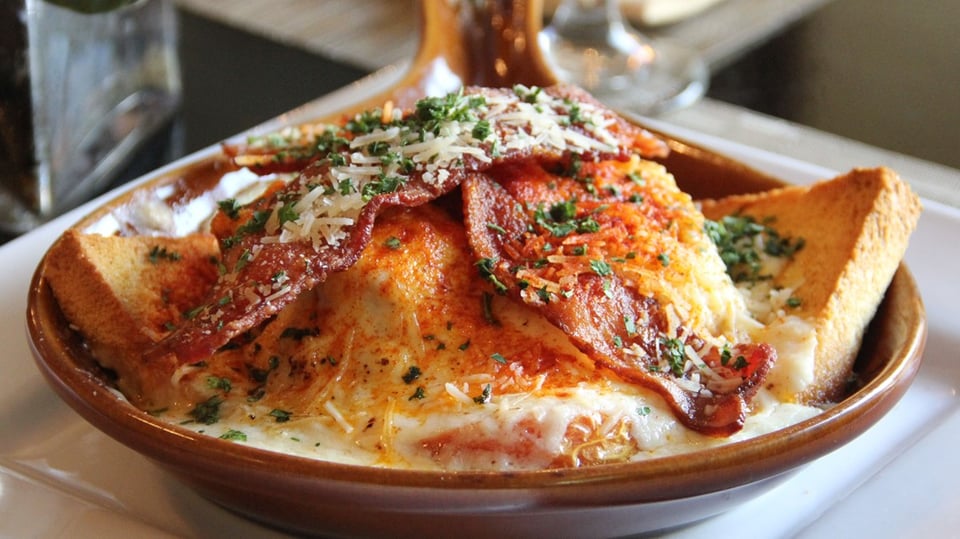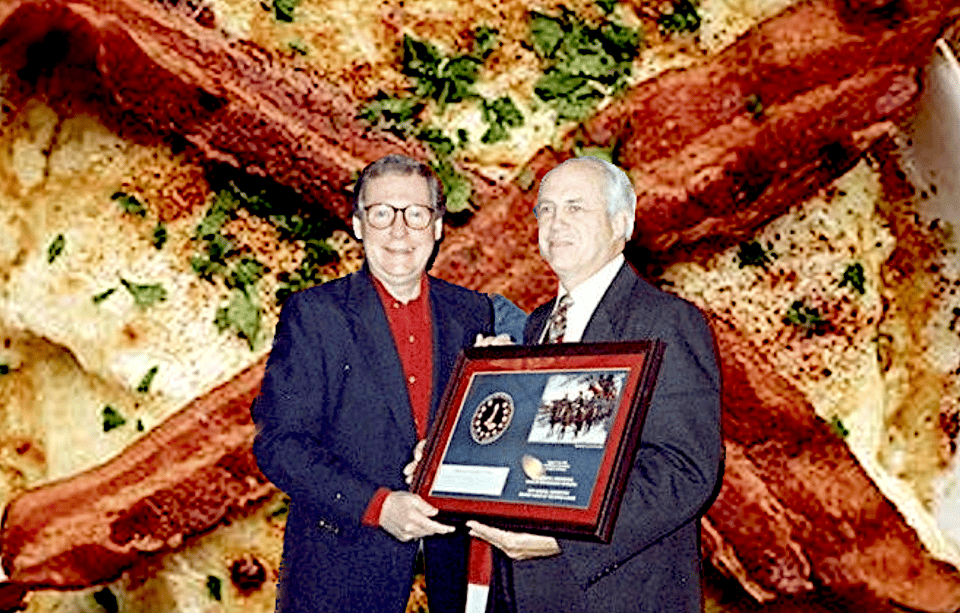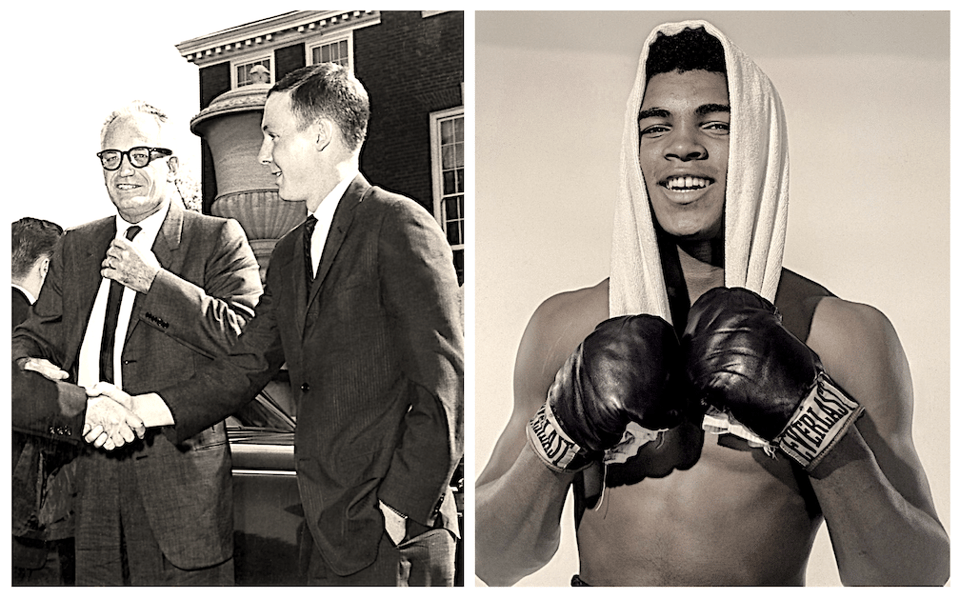Notable Sandwiches #88: Hot Brown

Welcome back to Notable Sandwiches, the feature where I, alongside my long-suffering editor David Swanson, wend my way through the ever-shifting document that is Wikipedia’s List of Notable Sandwiches, in alphabetical order. This week, a Kentucky special: the Hot Brown.
ALSO: NOTABLE SANDWICHES IS TAKING NEXT FRIDAY OFF BECAUSE I, TALIA, FINISHED MY BOOK AND AM VERY TIRED. CREATIVE WORK IS HARD TO SUMMON CONSISTENTLY. I FEEL THIN, STRETCHED, LIKE BUTTER SCRAPED OVER TOO MUCH BREAD. AS EVINCED BY THIS COLUMN. SEE YA SOON.

Let’s get this out of the way: the Hot Brown, despite what it sounds like, is not a turd sandwich.
In fact, it’s not even brown, although it is served hot. It’s white. It’s turkey and bacon on bread, garnished with parsley or tomato for color, and then smothered with mornay sauce—a French daughter sauce, descendant of béchamel, that adds Gruyere, cheddar or Emmental to the mix and with it a certain piquancy. Mornay sauce may or may not be named after a duke, or perhaps a pair of brothers, some generations later; a marquis and a comte, respectively. Either way, crossing the Atlantic and with it trading le tout-Paris of France for the bluegrass of Kentucky, it’s become instrumental to a sandwich in Louisville.
I’ll be honest. I’m deeply skeptical of this sandwich, for several reasons: the aforementioned turd-esque appellation, and because it’s a favorite dish of one Mitch McConnell, the similarly turd-esque—and turtle-esque—erstwhile Senate Majority Leader, whose physical putrescence has unfortunately not outpaced his moral deliquescence and damage to American democracy as a whole. Not only did the Senate cafeteria start serving Hot Browns in his honor, he also contributed a recipe for the sandwich to “Capitol Hill Cooks” in 2010.

The recent news of his forthcoming retirement did not, alas, come soon enough to redeem either him (that is no longer possible, even by his death, to be honest), or this sandwich column.
I also have to conquer, in offering an honest judgment of this sandwich, an innate New York myopia. Nearly everyone in this city considers themselves a cosmopolitan, while unconsciously limiting their worldview to the microgeography of the five boroughs, and the longer one has lived in the city and its environs, the more pronounced this effect is. There’s absolutely no excuse for me not being able to drive. I haven’t even been to Levittown, let alone Louisville.
That being said, while I may be far more familiar with the train route to Astoria than I am with, say, whether Kentucky is in the Midwest or the South (it’s neither; it’s both), I try to avoid the particular snobbery that accompanies New York provincialism. In general, I believe that people don’t deserve to be punished or blamed or degraded for the sins of their governments, and this includes red states. Women in places like Kentucky that prohibit divorce while they are pregnant don’t deserve to languish in unequal or abusive marriages, or have their reproductive rights curtailed in countless other ways. Kentucky’s minority population shouldn’t have to exist under the specter of police violence, or in a town still terrorized by the KKK. Universal healthcare should be universal, without borders. The point is, Mitch McConnell isn’t Kentucky’s fault; it’s the fault of the system that gave birth to his hideous, pickled-turtle heart, with its anthracite Confederate core. I come to praise Kentucky, not to shit on it. And the populace should eat whatever it finds most delicious.
Including the Hot Brown. Even though it isn’t even brown.
The Sword and the Sandwich is a newsletter about deadly serious extremism and serious sandwiches. Please consider supporting this work with a paid subscription.
Unlike a lot of the sandwiches we’ve covered here, this one has a very clear and undisputed provenance. It’s from the Brown Hotel, in Louisville, Kentucky, which still exists (and offers rooms at a pretty reasonable $200 per night for a luxury suite), where then-chef Fred Schmidt created the sandwich for a dinner dance in the 1920s. Jazz! Flappers! Bootleggers! Segregation! Lactic, binding white sauce on white bread for white revelers! Truly, it was a beautiful time. (Approximately 85% of all foods created in America before, like, 1987 had gluey white sauce in them; it was A Thing, and particularly beloved of the Depression-era Bureau of Home Economics).
Mitch McConnell was fourteen years old when his family moved to Louisville in 1956, the same year that the city’s school system was integrated. In fact, he was born almost exactly one month after Louisville’s undisputed favorite son, Muhammad Ali. But even though they were almost exact contemporaries, they were far from equals in the eyes of the law. Ali, then known as Cassius Clay, celebrated his high school prom in the ballroom of the Brown, but he wouldn’t have been able to enjoy a Hot Brown in the dining room: the hotel wasn't desegregated until 1963. When an all-Black production of "Porgy and Bess" was performed at the hotel’s theater in 1959, Black ticket holders were refused entry, sparking a campaign of sit-ins that helped launch Louisville’s civil rights movement. A year later, when Cassius Clay returned home from the Tokyo Olympics with a gold medal around his neck, he still couldn’t buy himself a cheeseburger to celebrate.
"I came back to Louisville after the Olympics with my shiny gold medal," he wrote in his 1975 biography, The Greatest. "Went into a luncheonette where black folks couldn't eat. Thought I'd put them on the spot. I sat down and asked for a meal. The Olympic champion wearing his gold medal. They said, 'We don't serve niggers here.' I said, 'That's okay, I don't eat 'em.' But they put me out in the street. So I went down to the river, the Ohio River, and threw my gold medal in it."

It’s a rotten legacy that managed to produce both the city’s most beloved native son, and its most reviled. "Today is Friday the thirteenth in Louisville," wrote Hunter S. Thompson, another native, in 1996. "The sky is low and the view from the penthouse suite at the Brown Hotel is dense. There is only one window in the hotel that opens, and I have it right here in my room. My chief of security had it chiseled open yesterday, despite the whining of the manager, who said it was an invitation to suicide." Today you can order up a $90 version of McConnell’s favorite sandwich from room service, as you stay in the hotel’s Muhammad Ali Suite.
Decades before the Brown allowed Black guests, the Hot Brown had already spread from the luxe hotel and prospered throughout Kentucky, alongside other beloved regional specialties like its signature bourbon whiskey, derby pie, benedictine spread (an ersatz-tzatziki with cream cheese and cucumber), and, of course, Colonel Sanders's famous fried chicken. I think that everyone should have a share of deliciousness, and should I ever achieve temporal power, I would create a Bureau of Delicious Sandwiches that would partition stacks of fabulous creations to each citizen—sandwich socialism for all—as well as a ruthless and instantaneous Thanos-like vaporization of anyone who wants to degrade the human rights of others (sorry but I’m tired of impotently waiting for wizened theocrats to die). Emphatically including Mitch McConnell, a man whose chinless, chelonian countenance has liplessly smiled over the greatest curtailment of civil rights since Jim Crow.
At any rate, you can try a Hot Brown in lots of places in Louisville; the Goose in Lyndon, Kentucky serves a pretty delicious one, by all accounts. If you want to go back to its roots, you can waltz into the Brown Hotel and enjoy the bounty of an entire century of culinary history there. Picture yourself at a dinner dance, with a Charleston shimmying through your body, a pretty moll (or a handsome gangster) on your arm, a mug of Prohibition-era moonshine and a Hot Brown on your plate. You are worth all that is delicious, and everything delicious is your province for today. I proclaim you free and as bodacious as the silkiest Mornay sauce. Allons-y!
Love,
Talia

Add a comment: